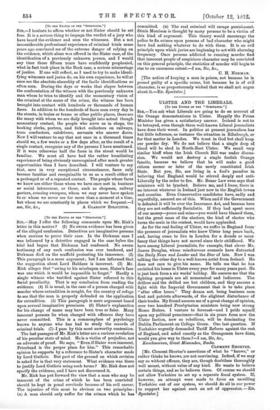[To THE EDITOR OP THE "SPECTATOR. "] Sin,—I hesitate to affirm
whether or not Slater should be set free. It is a serious thing to impugn the verdict of a jury who have beard the evidence and seen the witnesses. But a not inconsiderable professional experience of criminal trials some years ago convinced me of the extreme danger of relying on the evidence, which alone was offered in the Slater case, of the identification of a previously unknown person, and I would any time these fifteen years have confidently prophesied, what in fact took place in the Beck case, a serious miscarriage of justice. If one will reflect, as I used to try to make identi- fying witnesses and juries do, on his own experience, he will at once see the absolute absurdity of the facile identifications so often seen. During the days or weeks that elapse between the confrontation of the witness with the previously unknown man whom he tries to identify and the momentary vision of the criminal at the scene of the crime, the witness has been brought into contact with hundreds or thousands of human faces. In addition to the hundreds of faces seen every day in the streets, in trains or trams or other public places, there are the many with whom we are daily brought into actual though momentary contact, the people who serve us in shops, the booking clerks, porters, and ticket collectors on railways, tram conductors, cabdrivers, servants who answer doors. Now I will venture to say that not once in a thousand times should we, a few weeks or a few days after, as the result of a single contact, recognize any of the persons I have mentioned. If it were otherwise half the faces in the street would be familiar. We must all have had the rather humiliating experience of being obviously unrecognized after much greater opportunities than I have described. I will venture to say that, save in very exceptional circumstances, faces only become familiar and recognizable to us as a result either of a prolonged or of a repeated contact. The people whose faces we know are either those whom we have once met in business or social intercourse, or those, such as shopmen, railway porters, crossing sweepers, whom we may never have spoken to or whom we never see for more than a moment at a time, but whom we see constantly in places which we frequent. —I










































 Previous page
Previous page